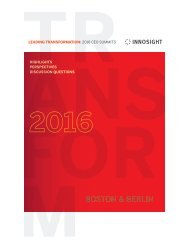TECHNOLOGY AT WORK
1Oclobi
1Oclobi
Create successful ePaper yourself
Turn your PDF publications into a flip-book with our unique Google optimized e-Paper software.
86<br />
Citi GPS: Global Perspectives & Solutions February 2015<br />
right, active labour market policies can be an efficient way to keep employment<br />
levels high and keep long-term unemployment low. 140<br />
But the extent to which ALMPs are used varies quite widely across different<br />
countries (Figure 63). For example, in Denmark, ALMP spending amounted to more<br />
than 2% of GDP in 2012, according to OECD data, roughly 1% of GDP in the<br />
Netherlands, France and Germany, but less than 0.5% in Italy, Portugal and the UK.<br />
In many of these countries, ALMP spending remains relatively unchanged<br />
compared to the level of ALMP spending in 2007, when unemployment was<br />
generally much lower (but fiscal coffers were fuller).<br />
Figure 63. Expenditure on Active Labour Market Policies (% of GDP)<br />
2.5<br />
2.0<br />
1.5<br />
1.0<br />
0.5<br />
0.0<br />
Source: OECD<br />
Will Taxation Have to Change to Adapt to the World of Work in the 21 st<br />
Century?<br />
Changes in the nature of work going forward<br />
will have an effect on fiscal costs<br />
The changes in the world of work that we describe can have large fiscal costs for<br />
two reasons. First, to the extent that average wage growth is suppressed and<br />
unemployment raised, tax receipts will suffer. Second, some potential policy<br />
responses to ameliorate the adverse effects of the changes in the structure and<br />
nature of employment (such as expanding active labour market policies or lowering<br />
tax wedges, or increased spending on education or social spending) will likely carry<br />
substantial fiscal costs, too. Unlike in the past where such policies were sometimes<br />
dialled up in a downturn, the new structure of work may imply that such policies may<br />
need to be adopted much more consistently and in greater scope.<br />
140 See e.g. European Commission (2006) and Boone and van Ours (2004)<br />
© 2015 Citigroup










